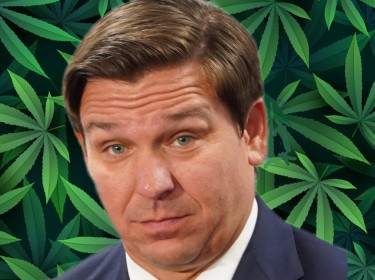
In a heated and escalating debate over cannabis legalization in Florida, Curaleaf Chair Boris Jordan has publicly criticized Governor Ron DeSantis, asserting that the governor is “on the wrong side of history” regarding marijuana policy. This statement came amid the contentious campaign surrounding Amendment 3, a proposed constitutional amendment that seeks to legalize recreational cannabis for adults in the state. The clash highlights not only the political stakes involved but also the broader implications for Florida’s burgeoning cannabis industry.
While Amendment 3 failed at the voting booth by a small margin, it begs the question, would Curaleaf and Truelive be a monopoly in the Florida recreational cannabis market?
The Background of the Debate
The backdrop to this conflict is Florida’s evolving stance on cannabis. In 2016, voters approved Amendment 2, which legalized medical marijuana, leading to a significant expansion of the industry. However, the push for full legalization has faced considerable resistance from state officials, particularly Governor DeSantis. As public support for recreational cannabis grows recent polls indicate that a majority of Floridians favor legalization the governor’s opposition has become increasingly vocal.
DeSantis’s Critique of Trulieve
Governor DeSantis has directed sharp criticism at Trulieve, Florida’s largest medical marijuana operator, labeling it “Big Pharma on steroids.” His comments suggest that he views the company as prioritizing profit over public health and safety. During a recent press conference, DeSantis accused Trulieve of using its substantial financial resources to influence legislation and secure an advantageous position in the market.
Trulieve is trying to push this amendment not for the good of Floridians but to line their pockets,” DeSantis stated. He emphasized that the financial backing behind Amendment 3 reportedly exceeding $140 million comes primarily from Trulieve and its allies, framing it as an attempt to create a monopoly that would benefit corporate shareholders rather than everyday Floridians.
Boris Jordan’s Response
In stark contrast to DeSantis’s assertions, Boris Jordan defended the push for legalization and criticized the governor’s stance. He argued that DeSantis is missing an opportunity to embrace a progressive policy that could yield significant economic benefits for Florida. “The governor is on the wrong side of history,” Jordan declared in a social media post. “States across America are seeing positive outcomes from legalizing adult-use cannabis more jobs, increased tax revenue, and reduced crime rates.”
Jordan pointed out that many states have successfully implemented recreational cannabis laws without compromising public safety. He emphasized that legalizing cannabis can lead to better regulation and oversight of the market, ultimately benefiting consumers and reducing illegal sales.
The Stakes of Amendment 3
Amendment 3 aimed to decriminalize possession of up to three ounces of marijuana for adults aged 21 and older. If passed, it would have allow licensed operators including both medical marijuana companies like Trulieve and new entrants to sell recreational cannabis products across Florida. Proponents argued that this would create a regulated market that ensures quality control and generates tax revenue for essential public services.
However, DeSantis framed Amendment 3 as a dangerous proposal that could lead to increased access for minors and undermine public health initiatives. He has called on voters to reject the amendment, asserting that it does not serve the interests of Floridians but rather those of corporate entities seeking profit.
The Response from Trulieve
In response to DeSantis’s comments, Trulieve CEO Kim Rivers defended her company’s involvement in supporting Amendment 3. She dismissed the governor’s claims as “political disinformation” aimed at swaying public opinion against legalization efforts. Rivers emphasized that Trulieve’s financial contributions are part of a broader coalition advocating for responsible cannabis use and regulation.
Rivers also addressed concerns about monopolization, explaining that while Trulieve is a significant player in the market, the amendment includes provisions designed to ensure fair competition among licensed operators. She argued that concerns about liability and accountability are unfounded and reiterated her belief in the positive impact legalization could have on Florida’s economy.
Broader Implications for Cannabis Policy
The ongoing debate over cannabis legalization in Florida reflects broader national trends regarding marijuana policy. As more states move toward legalization both for medicinal and recreational use—Florida finds itself at a crossroads. The outcome of Amendment 3 could set a precedent for future legislative efforts and influence public perception of cannabis use.
Advocates argue that legalizing recreational cannabis could lead to substantial economic benefits for Florida, including job creation in cultivation, distribution, and retail sectors. Additionally, tax revenues generated from legal sales could be directed toward education, healthcare, and infrastructure projects.
Conversely, opponents like DeSantis warn about potential public health risks associated with increased access to cannabis products. They argue that without proper regulations in place, legalization could exacerbate issues related to substance abuse and youth access.
Public Sentiment and Future Prospects
As Election Day approached, public sentiment appeared to be shifting toward support for Amendment 3. Recent surveys indicated that a majority of Floridians favor legalizing recreational cannabis use. This growing acceptance may put pressure on state officials like DeSantis to reconsider their positions as they navigate an increasingly pro-cannabis electorate.
Moreover, with major financial backing from companies like Trulieve supporting Amendment 3, advocates were optimistic about their chances at the ballot box. The potential success of this amendment could not only reshape Florida’s cannabis landscape but also influence similar efforts in other states grappling with legalization debates.
Conclusion
The clash between Governor Ron DeSantis and cannabis advocates exemplifies the complexities surrounding marijuana policy in Florida. As both sides mobilized resources and supporters ahead of the vote on Amendment 3, the implications extend far beyond state borders. Should Florida choose to embrace legalization, it could pave the way for significant changes in how cannabis is perceived and regulated across the nation.
As voters prepared to make their voices heard on this pivotal issue, one thing is clear: the debate over cannabis is far from over. With strong opinions on both sides and substantial financial stakes involved, While Amendment 3 failed to get the required 60% to pass the bill, it did get over 50%, showing a majority of Florida voters want recreational marijuana in the state. Florida stands at a critical juncture in its journey toward potential legalization—a journey that could redefine its economic landscape and social fabric for years to come.







